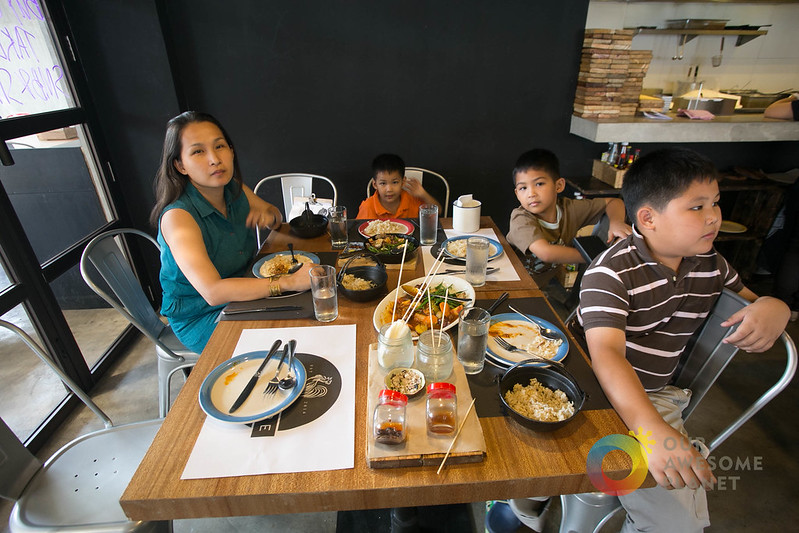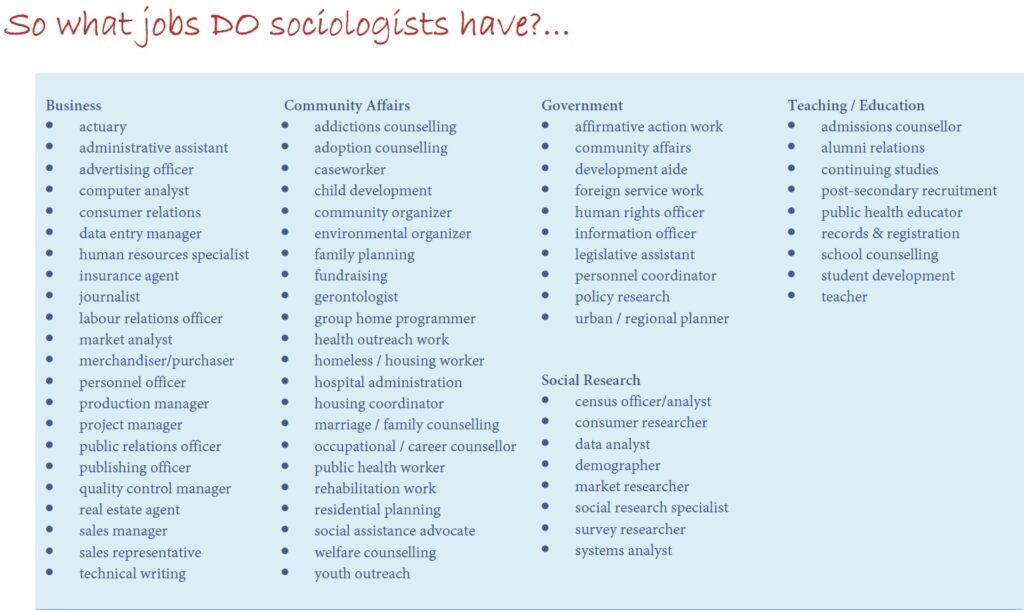Chapter 1. An Introduction to Sociology
1.4. Why Study Sociology?

When Bernard Blishen picked up the phone one day in 1961, he was surprised to hear Chief Justice Emmett Hall on the other end of the line asking him to be the research director for the newly established Royal Commission on Health Services. Publically funded health care had been introduced for the first time in Canada that year, by a socialist Co-operative Commonwealth Federation (CCF) government in Saskatchewan, amid bitter controversy. Doctors in Saskatchewan went on strike and private health care insurers mounted an expensive anti-public health care campaign. Because it was a Progressive Conservative government commission, appointed by Prime Minister John Diefenbaker, Blishen’s colleagues advised him that it was going to be a whitewash document to defend the interests of private medical care. However, Blishen took on the project as a challenge, and when the commission’s report was published it advocated that the Saskatchewan plan be adopted nationally (Vaughan, 2004).
Blishen went on to work in the field of medical sociology and also created a widely-used index to measure socioeconomic status known as the Blishen scale. He received the Order of Canada in 2011 in recognition of his contributions to the creation of public health care in Canada.
Since sociology was first founded, many people have been driven by the scholarly desire to contribute knowledge to this field, while others have seen it as way not only to study society, but also to improve it. Besides the creation of public health care in Canada, sociology has played a crucial role in many important social reforms such as equal opportunity for women in the workplace, improved treatment for individuals with mental and learning disabilities, increased recognition and accommodation for people from different ethnic backgrounds, the creation of hate crime legislation, the right of Indigenous populations to preserve their land and culture, and prison system reforms.
The prominent sociologist Peter L. Berger (1929–2017), in his 1963 book Invitation to Sociology: A Humanistic Perspective, describes a sociologist as “someone concerned with understanding society in a disciplined way.” He asserts that sociologists have a natural interest in the monumental moments of people’s lives, as well as a fascination with banal, everyday occurrences. Berger also describes the “aha” moment when a sociological theory becomes applicable and understood:
[T]here is a deceptive simplicity and obviousness about some sociological investigations. One reads them, nods at the familiar scene, remarks that one has heard all this before and don’t people have better things to do than to waste their time on truisms — until one is suddenly brought up against an insight that radically questions everything one had previously assumed about this familiar scene. This is the point at which one begins to sense the excitement of sociology (Berger, 1963).
Sociology can be exciting because it teaches people ways to recognize how they fit into the world and how others perceive them. Looking at themselves and society from a sociological perspective helps people see how they connect to different groups based on the many different ways they classify themselves and how society classifies them in turn. It raises awareness of how those classifications — such as economic class, social status, education, ethnicity, or sexual orientation — affect perceptions and privileges.
Sociology teaches people not to accept easy explanations. It teaches them a way to organize their thinking so that they can ask better questions and formulate better answers. It makes people more aware that there are many different kinds of people in the world who do not necessarily think the way they do. It increases their willingness and ability to try to see the world from other people’s perspectives. Sociology prepares people to live and work in an increasingly diverse and integrated world.
Making Connections: Sociological Research
Farming and Locavores: How Sociological Perspectives Might View Food Consumption

The consumption of food is a commonplace, daily occurrence, yet it can also be associated with important moments in people’s lives. Eating can be an individual or a group action, and eating habits and customs are influenced by culture. In the context of society, a nation’s food system is at the core of numerous social movements, political issues, and economic debates. Any of these factors might become a topic of sociological study.
A structural-functional approach to the topic of food consumption might be interested in the role of the agriculture industry within the nation’s economy and the social system as a whole. Food production is a primary example of Talcott Parsons’ function of adaptation: human systems need to adapt to ecosystems. In this regard the structural-functionalist would be interested in the potential for disequilibrium in the human/environment relationship that has resulted from increases in population and the intensification of agricultural production — from the early days of manual-labour farming to modern mechanized agribusiness. In many respects the concerns of environmentalists and others, with respect to the destructive relationship between industrial agriculture and the ecosystem, are the results of a dysfunctional system of adaptation. The concept of sustainable agriculture, promoted by Michael Pollan (2006) and others, points to the changes needed to return the interface between humans and the natural environment to a state of dynamic equilibrium.
A sociologist viewing food consumption through a symbolic interactionist lens would be more interested in micro-level topics of the shared meaning of food, such as the symbolic use of food in religious rituals, the attitudes towards food in fast food restaurants, or the role it plays in health regimens or the social interaction of a family dinner. This perspective might also study the interactions among group members who identify themselves based on their sharing a particular diet, such as vegans (people who do not eat meat or dairy products) or locavores (people who strive to eat locally-produced food). The increasing concern that people have with their diets speaks to the way that the life of the biological body is as much a symbolic reality, interpreted within contemporary discourses on health risks and beauty, as it is a biological reality.
A critical sociologist might be interested in the power differentials present in the regulation of the food industry, exploring where people’s right to information intersects with corporations’ drive for profit and how the government mediates those interests. Critical sociologists might also be interested in the power and powerlessness experienced by local farmers versus large farming conglomerates. In the documentary Food Inc. (Kenner, 2009), the plight of farmers resulting from Monsanto’s patenting of seed technology is depicted as a product of the corporatization of the food industry. Another topic of study might be how nutrition and diet varies between different social classes. The industrialization of the food chain has created cheaper foods than ever, yet with the trade-off that the poorest people in society eat the food with the least nutritional content.
Sociology in the Workplace
Employers continue to seek people with what are called “transferable skills.” This means that they want to hire people whose knowledge and education can be applied in a variety of settings and whose skills will contribute to various tasks. Studying sociology can provide people with this wide knowledge and a skillset that can contribute to many workplaces, including:
- An understanding of social systems and large bureaucracies;
- The ability to devise and carry out research projects to assess whether a program or policy is working;
- The ability to collect, read, and analyze statistical information from polls or surveys;
- The ability to recognize important differences in people’s social, cultural, and economic backgrounds;
- Skill in preparing reports and communicating complex ideas; and
- The capacity for critical thinking about social issues and problems that confront modern society (Department of Sociology, University of Alabama, 2015).
Sociology prepares people for a wide variety of careers. Sociologists are skilled at communications (oral, written and, increasingly, digital), at research methods (both qualitative and quantitative), and at policy analysis and provision. Besides actually conducting social research or training others in the field, people who graduate from university with a degree in sociology are hired by government agencies, non-governmental organizations, and corporations in fields such as social services, counseling (e.g., family planning, career, substance abuse), designing and evaluating social policies and programs, health services, polling and independent research, market research, and human resources management. Even a small amount of training in sociology can be an asset in careers like sales, public relations, journalism, teaching, law, and criminal justice.

Media Attributions
- Figure 1.22 Hon. T.C. Douglas, Premier of Saskatchewan by Lieut. G. Barry Gilroy, via Wikipedia, is in the public domain.
- Figure 1.23 Locavore-30 by Anton Diaz via Flickr is used under a CC BY-NC-SA 2.0 licence.
- Figure 1.24 Occupational Destinations for Sociology BAs in Broad Labour Market Sectors by UBC Department of Sociology and the Canadian Sociological Association is used by permission of the Canadian Sociological Association.

